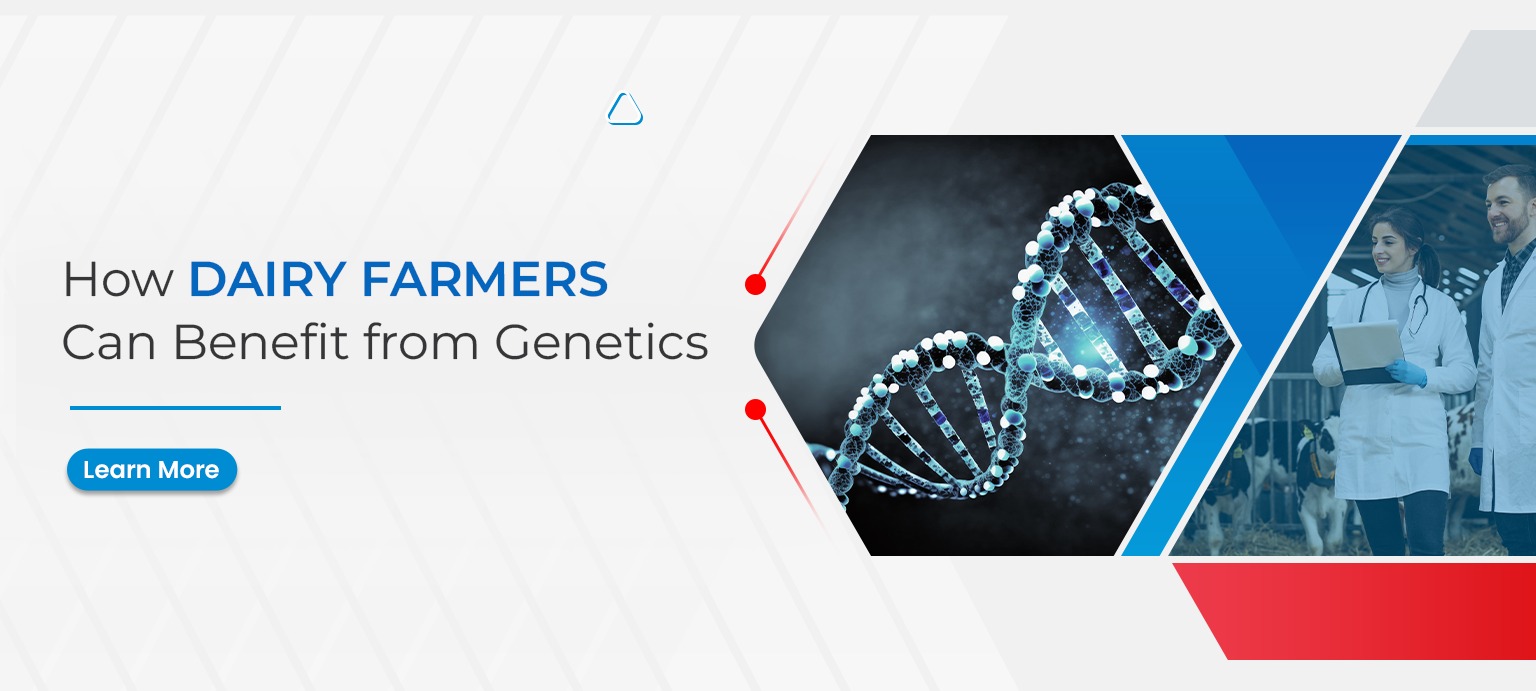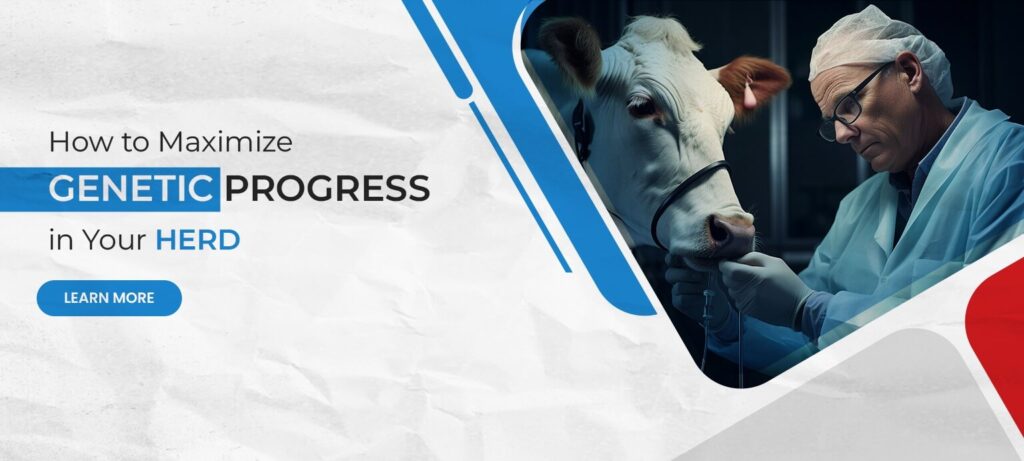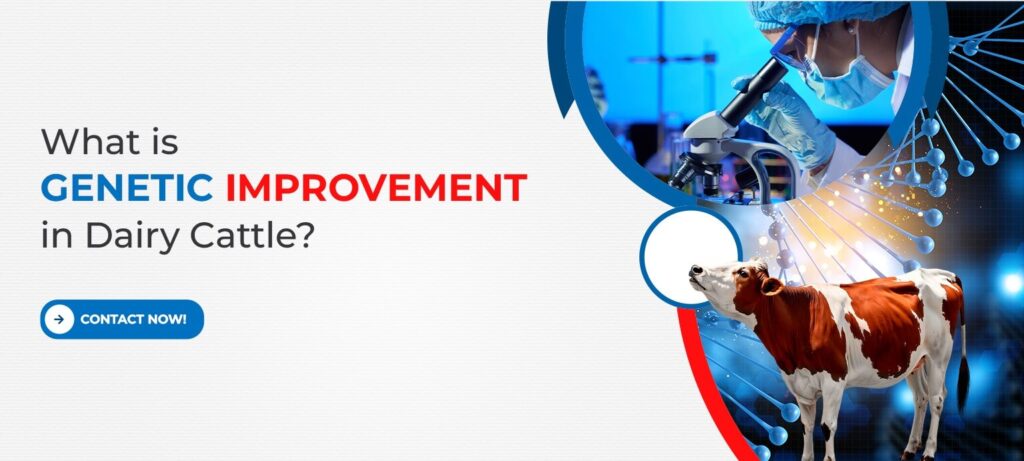Dairy farming is a challenging yet rewarding venture, requiring continuous efforts to enhance efficiency and productivity. Genetics plays a pivotal role in shaping the future of dairy farming by improving animal health, productivity, and overall profitability. In this blog, we’ll delve into how dairy farmers can leverage genetics to their advantage and maximize their farm’s potential.
Understanding Genetics in Dairy Farming
Genetic Selection for Improved Traits: Genetic selection is the process of choosing animals with desirable traits for breeding, leading to offspring inheriting those traits. Dairy farmers can benefit by selecting animals with traits such as higher milk production, improved fertility, better disease resistance, and longevity.
Enhancing Milk Production Efficiency: Through genetic selection, dairy farmers can breed cows that are more efficient at converting feed into milk. Traits like higher milk yield, better milk composition (e.g., higher protein and fat content), and improved udder health can significantly boost milk production efficiency.
Improving Animal Health and Welfare
Disease Resistance and Resilience: Genetics plays a crucial role in enhancing disease resistance among dairy cattle. By selectively breeding for traits associated with disease resistance, farmers can reduce the incidence of common ailments such as mastitis, lameness, and metabolic disorders, thus lowering veterinary costs and improving animal welfare.
Reducing Environmental Impact: Genetic improvements can contribute to reducing the environmental footprint of dairy farming. Cows with better feed efficiency produce less methane, leading to reduced greenhouse gas emissions per unit of milk produced. Selecting for traits that require less water and feed can also help conserve resources.
Longevity and Sustainability
Increased Lifespan of Cows: Genetics can influence the longevity of dairy cows. Breeding for traits associated with longevity, such as robust health, strong feet and legs, and good fertility, can lead to cows that have longer, more productive lives, ultimately reducing replacement costs and improving sustainability.
Breeding for Sustainable Production Systems: Sustainable dairy farming involves optimizing resource use while minimizing negative environmental impact. Genetics can help in developing cows that are well-adapted to specific production systems, whether conventional or organic, thereby improving overall sustainability.
Utilizing Advanced Technologies
Genomic Selection: Genomic selection utilizes DNA information to predict an animal’s genetic merit accurately. By using genomic testing, dairy farmers can identify superior animals at a young age, allowing for more precise breeding decisions and faster genetic progress.
Artificial Insemination (AI) and Embryo Transfer: AI and embryo transfer techniques enable dairy farmers to access genetics from top-performing bulls and cows worldwide. This allows for a broader genetic pool and facilitates the introduction of desirable traits into the herd more rapidly.
Financial Benefits and Return on Investment
Increased Profitability: Genetic improvements lead to increased productivity, efficiency, and overall profitability for dairy farmers. Higher milk yields, improved reproductive performance, reduced veterinary costs, and longer cow lifespan contribute to a healthier bottom line.
Reduced Input Costs: Cows with better genetics require fewer inputs for the same level of production. They are more efficient at converting feed into milk, reducing feed costs per unit of milk produced. Moreover, healthier cows mean lower medication and treatment expenses.
Challenges and Considerations
Balancing Traits: Dairy farmers need to balance various traits when making breeding decisions. For instance, selecting for higher milk production may sometimes compromise traits like fertility or longevity. It’s essential to prioritize traits based on the farm’s specific goals and management practices.
Cost of Implementation: While genetics offer significant benefits, implementing genetic improvement programs may involve initial costs such as genomic testing, AI services, and semen from elite sires. However, these costs are often outweighed by long-term benefits.
The Bottom Line
In conclusion, genetics plays a fundamental role in shaping the success and sustainability of dairy farming operations. By strategically selecting and breeding for desirable traits, dairy farmers can enhance milk production efficiency, improve animal health and welfare, increase profitability, and contribute to a more sustainable future for the dairy industry. Embracing genetic technologies and practices is key to unlocking the full potential of dairy farming in the modern age.
If you are currently interested in innovative and state-of-the-art solutions tailored to optimize every facet of your dairy farming practices, from genetic enhancements to breeding strategies, as well as overall operational efficiency and sustainability, Accuvance India is your ideal partner. With our extensive suite of cutting-edge genetic technologies, coupled with expert consultation services, we are dedicated to supporting you throughout every stage of your dairy farming journey. Our mission is to collaborate with you in achieving your objectives effectively and sustainably, while simultaneously ensuring the long-term success and resilience of your dairy farm operations.









